Israel-Hamas war live: four-day ceasefire begins but IDF says ‘war is not over yet’ | Israel-Hamas war
‘War is not over yet’, Israeli military spokesperson warns
“The war is not over yet,” the Israeli military spokesman Avichay Adraee has said in a message in Arabic to Palestinian civilians in Gaza. In a post on X, formerly Twitter, he said:
The humanitarian pause is temporary. The northern Gaza Strip is a dangerous war zone and it is forbidden to move north. For your safety, you must remain in the humanitarian zone in the south.
It is only possible to move from the north of the Strip to the south via Salah al-Din Road. The movement of residents from the south of the Strip to the north is not allowed and dangerous
Prior to the ceasefire, Israel repeatedly bombed the south of Gaza despite telling Palestinians to flee there.
Key events
Sirens have sounded in Israel’s southern Red Sea resort of Eilat, warning of a possible long-range aerial attack from Yemen, Reuters quotes the country’s military as saying. Yemeni Houthis have previously launched drones and missiles at Israel in solidarity with Palestinian militants.
Jason Burke
In the crowded corridors of the European hospital in Khan Younis, exhausted doctors decide who among the huge influx of patients arriving from the north of Gaza should live or die.
Hundreds of casualties have moved south in recent days after the evacuation of hospitals in Gaza City, overwhelming medical staff already struggling with an acute lack of medicine, diminishing food rations and intermittent power and communications.
Injured people have joined thousands of displaced people seeking shelter and safety in medical facilities.
Paul Ley, an orthopaedic surgeon at the European hospital, said displaced people were sleeping in lifts, a small team was working round the clock in four operating theatres to amputate limbs infected after days without treatment, and there was an acute shortage of painkillers. Triage decisions had to be made instantly, which in one case meant leaving a 12-year-old child to die with only palliative care in order to preserve dwindling resources.
Ley said the hospital had received 500 patients evacuated from hospitals in northern Gaza in recent days.
The UK foreign secretary, David Cameron, is continuing his trip to the Middle East on Friday, meeting Palestinian leaders and committing the UK to a further £30m in aid for people in Gaza.
He will be in the occupied Palestinian territories, meeting Palestinian leaders and agencies delivering aid in Gaza and advocating adherence to the new agreement on all sides. Talks will focus on how UK efforts can help ease the suffering of Gaza’s citizens, who have been bombarded and besieged by Israel’s military, as more humanitarian aid is set to enter the territory amid the lull in fighting.
The former prime minister is urging “all parties to continue to work towards the release of every hostage” after holding talks with the Iaraeli prime minister, Benjamin Netanyahu, and the country’s president, Isaac Herzog, on Thursday.
The temporary ceasefire began at 7am local time (5am GMT). The first 13 hostages – women and children – are expected to be freed by Hamas at about 4pm local time (2pm GMT). They are the first of 50 due to be released over the four days, according to Qatari officials. Hamas said 150 Palestinian prisoners would be released by Israel.
The British daughter of a man who was kidnapped from Israel and taken to Gaza says her father would be “fighting to be at the back of the queue” of hostages to be released by Hamas.
Sharone Lifschitz told BBC Breakfast she did not know whether her father was dead or alive, only that he was taken to Gaza after being kidnapped from his home in the kibbutz of Nir Oz on 7 October. Speaking from Tel Aviv, she said:
My father spent 65 years building this community, we grew up collectively as children in my generation. If there is a queue, he is fighting to be at the back of the queue.
She said every hostage released was a “ray of light” in a “long and horrendous story”. Lifschitz’s mother, Yocheved Lifshitz, was released by Hamas from Gaza last month.
The UK prime minister, Rishi Sunak, has thanked Qatar and Egypt for their “intensive diplomacy” in helping to secure the pause in the fighting in Gaza.
The temporary truce came into effect early on Friday, setting the stage for the exchange of dozens of hostages held by militants in Gaza for Palestinians imprisoned in Israel.
Sunak tweeted: “This humanitarian pause is critical to end the terrible ordeal of hostages held by Hamas and get life-saving aid into Gaza.
“I want to thank Qatar, Egypt and others for the intensive diplomacy that has got us here. We will not stop until all hostages are safely returned.”
People in Gaza are salvaging what they can as the guns fall silent.
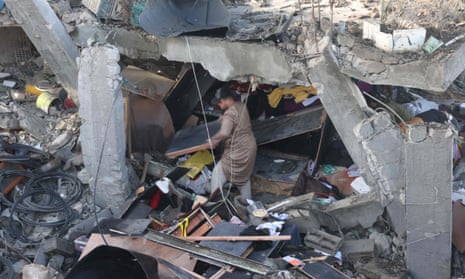
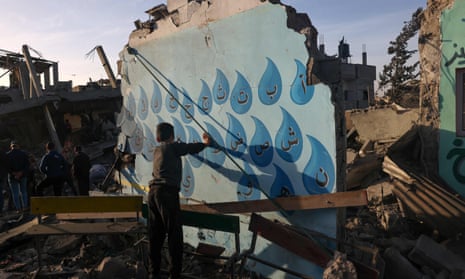
Aid trucks have been pictured as they enter Gaza via the Rafah crossing hours after the start of a four-day truce.
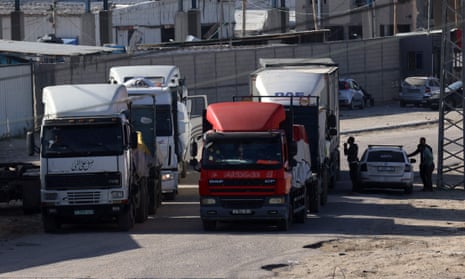
Aid trucks begin entering Gaza, Reuters reports
Aid trucks have begun entering the Gaza Strip from Egypt around 90 minutes after a truce began between Israel and Hamas fighters, according to Reuters TV footage.
Two of the trucks, representing Egyptian organisations, sported banners that said “Together for Humanity”. Another said “For our brothers in Gaza”.
Pictures taken during the first hours of the truce have begun emerging from Gaza and the border area:
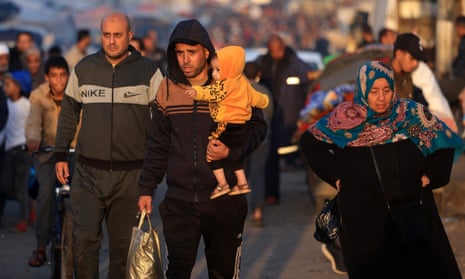
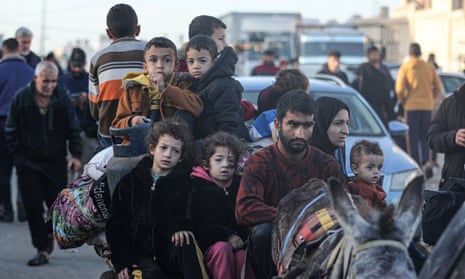



Patrick Wintour
Advanced plans by Saudi Arabia to strike a peace deal with the Houthi rebels in Yemen are being jeopardised by Houthi attacks on Israel and this week’s seizure of an Israeli-linked commercial vessel in the Red Sea.
Saudi Arabia hopes it can maintain a firewall between the Yemen peace talks and the Houthis’ attacks on Israel, but in London and Washington there is pressure to redesignate the Houthis as a terrorist organisation, which would threaten any deal.
There are also reports that the US is willing to launch an attack on Houthi military sites in and around Yemen’s capital, Sana’a, as well as its port operations room, unless the ship seized on Sunday, the Galaxy Leader, is released.
Last week the Saudis summoned the official UN-recognised Yemen government for further talks in Riyadh to present a revised roadmap that would lead to foreign forces, including those from Saudi Arabia, leaving in six months. It includes a budget deal under which large sums would be transferred from the oil-rich south to the impoverished north, which is dominated by the Iranian-backed Houthis.
Critics of the deal claim it empowers the Houthis, but Saudi Arabia, eager to exit what has proved to be an ill-judged military intervention in Yemen’s civil war, wants to end its engagement as quickly as possible.
Britain will provide a further £30m ($37.38m) of humanitarian aid to Gaza, the UK foreign secretary, David Cameron, has said as he travels to the occupied Palestinian territories on the second day of his visit to the region.
Cameron will meet Palestinian leaders and aid agencies.
On Thursday, he met the Israeli prime minister, Benjamin Netanyahu, during which he expressed hope that the truce with Hamas would be an “opportunity to crucially get hostages out and get aid into Gaza”.
In a statement on Friday, Cameron said:
We are hopeful that today will see the release of hostages, and I am urging all parties to continue to work towards the release of every hostage. A pause will also allow access for life-saving aid to the people of Gaza.
I am proud that a fourth UK flight carrying critical supplies landed in Egypt today, and I can announce new £30m of funding which will be spent on vital aid such as shelter and medical provisions.
It is vital to protect civilians from harm, and we are urgently looking at all avenues to get aid into Gaza, including land, maritime and air routes. The new pledge will double the amount of additional aid Britain has committed to Gaza since the conflict began in October.
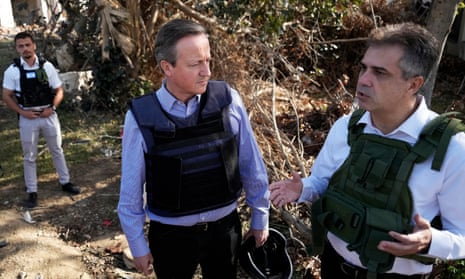
The hostage release is due to start at 4pm, the Israeli newspaper Haaretz has reported, without citing a source.
It’s not clear who will be in the first batch to be released but there have been lots of reports about the possibility of Avigail Idan, an American child who turns four on Friday, being among them.
When asked about the possibility of her being among those released, the US president, Joe Biden, said: “I’m keeping my fingers crossed.”
Avigail was kidnapped from kibbutz Kfar Aza on 7 October during the Hamas attack on southern Israel, according to the Jerusalem Post. Her parents, Roee and Smadar Idan, were killed while her two older sibilings survived by hiding in closets.
No soldiers are expected to be among the women released.
‘War is not over yet’, Israeli military spokesperson warns
“The war is not over yet,” the Israeli military spokesman Avichay Adraee has said in a message in Arabic to Palestinian civilians in Gaza. In a post on X, formerly Twitter, he said:
The humanitarian pause is temporary. The northern Gaza Strip is a dangerous war zone and it is forbidden to move north. For your safety, you must remain in the humanitarian zone in the south.
It is only possible to move from the north of the Strip to the south via Salah al-Din Road. The movement of residents from the south of the Strip to the north is not allowed and dangerous
Prior to the ceasefire, Israel repeatedly bombed the south of Gaza despite telling Palestinians to flee there.
Truce officially in place but sirens sound in southern Israel
Around 40 minutes into the truce it’s difficult to say whether it’s holding. The Israeli military (IDF) said sirens warning of potential incoming rockets had sounded in two Israeli communities near Gaza but there was no immediate confirmation that attacks had occurred or of any damage or casualties.
A CNN team in the southern Israel city of Sderot meanwhile reported “loud booms” that sounded like Israeli artillery fire landing in Gaza, up to 15 minutes after the ceasefire was meant to be in place. Smoke was also continuing to rise from Gaza, the source of which was unknown, the team said.
Hostilities appeared to have continued up until the last moment, with Israeli forces reportedly attacking the Indonesian hospital in northern Gaza overnight, as well as striking a residential building in Nuseirat refugee camp in central Gaza.
A BBC reporter also in Sderot noted an Israeli airstrike as well the sound of small arms fires, drones and mortars with less than an hour to go before the truce.
Sirens sound in Israeli communities near Gaza border, Israeli military says
Sirens warning of potential incoming rockets have sounded in communities near the Gaza Strip, the Israeli military (IDF) has said in a Telegram post.
As we reported earlier it said sirens had sounded in a kibbutz near the Strip a couple of hours before the truce was due to come into effect. Fifteen minutes before the 7am start time it said sirens had also sounded in kibbutz Nir Oz.
Our correspondent Jason Burke has interviewed Dr Paul Ley, a French orthopaedic surgeon at the European hospital in Khan Younis, southern Gaza, where conditions are dire. Here’s an excerpt from his story:
Ley said the hardest thing for doctors was to make triage decisions. “We do our triage … (asking) are we going to take this patient because they will have a good chance of surviving rather than doing desperate measures on a patient who will die in two or three days? That sounds nice on paper, but when you have to make the decision it is different. There’s a 12-year-old with 90% burns so we won’t treat him except for pain control that is not enough,” he said.
“We try to keep our heads cool and steady, but for local staff this is their families, friends, their people. They never want to amputate. They say: ‘I can’t do it any more’ and so I say: ‘OK I will do it, don’t worry,’ and you can feel the relief”.
Ley said he had been shocked at how passive many patients were, such as one 35-year-old woman whose husband and children had been killed when the family’s home was destroyed, and who appeared unmoved when told both her legs would need to be amputated. “So many just don’t care any more,” he said.
The truce should now theoretically be in effect, as the clocks have struck 7 am in Israel and Gaza.
Israeli strikes on Gaza have reportedly continued overnight, with Al Jazeera reporting an attack on a residential building in Nuseirat refugee camp in central Gaza.
A BBC reporter in Sderot in southern Israel also noted an Israeli airstrike, drones and the sound of small arms and mortar fire coming from Gaza with less than an hour to go before the truce is supposed to be implemented.
It’s now minutes before it is due to take effect.

